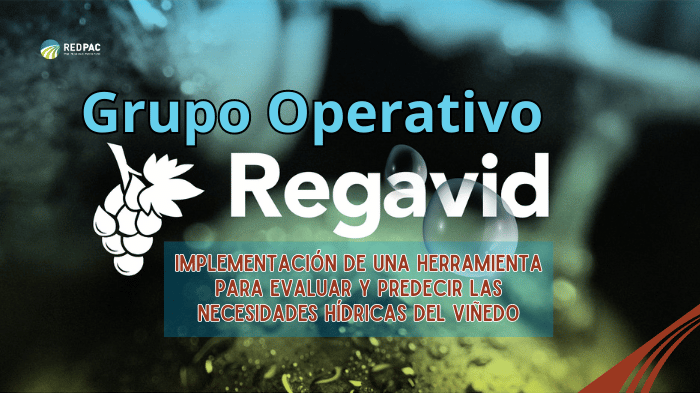
01 de April de 2024
Innovación
The Regavid Operational Group is working in Galicia to find sustainable irrigation strategies for these types of crops, so that their real needs can be understood in a future with greater potential for drought.
- The goal is to understand current water needs and adapt future forecasts to climate change.
- The tool will be available between September and October 2024
The increasingly visible consequences of climate change on crops are leading agricultural research projects to try to predict these behaviors and to make crops more resilient or, at least, to anticipate possible eventualities to ensure their survival.
In the case of vineyards , rising temperatures lead to faster growth periods, higher acidity levels, and, above all, greater water and heat stress.
The Regavid Operational Group It works in Galicia to find sustainable irrigation strategies for these types of crops, so that their real needs can be understood in a future with greater possibilities of drought.
Objectives and actions
The main objective of the project is to develop an irrigation management tool with the following functions:
- Be able to assess and predict the water requirements of vineyard crops in advance.
- Optimize water use in the irrigation of this type of crops.
- Improve and increase the sustainability of the sector through better use of resources and minimizing their waste.
Thus, the key is to properly diagnose current needs to predict future water needs.
To achieve this, the group carries out a series of specific activities:
- Study of areas where humidity sensors will be installed, as well as soil analysis and electrical conductivity.
- Installation of equipment , including probes, control points, and water volume meters. The irrigation system is also evaluated.
- Definition of treatments , so that the areas of the winery that are normally irrigated are differentiated from those that are dry land or irrigated using the techniques developed with the project.
- Measurement of water content in soil with moisture measuring probes.
- Field controls , with a series of techniques such as phenology monitoring, canopy characterization, or production evaluation.
- Development of models that allow for the modeling of current water requirements and 7-day prediction models of reference evapotranspiration and crop coefficient. This is where the irrigation management tool is developed.
- Finally, a dissemination plan will be implemented, thus communicating the results to the sector and interested parties through dissemination actions.
The project is currently being developed on a plot of land belonging to the Martín Códax winery in the Monterrei region (Orense), where they are implementing techniques to achieve more efficient water use through weather forecasting.
Thanks to the work of the PROEPLA Research Group at the University of Santiago de Compostela , experts take measurements of the water level in the plot to develop prediction models.
Ultimately, once the management tool is created, it will allow for planning the appropriate amount of water needed by vineyards with a 7-day forecast. The Operational Group announced in an online seminar that this tool will be fully available by September or October 2024.
Partners and financing
The Regavid Operational Group is coordinated by the Monet Viticultura company . It also includes the Martín Códax wineries, the PROEPLA Research Group of the University of Santiago de Compostela, and the Galician Business-University Foundation ( FEUGA ).
It has a budget of 180,000 euros, fully financed by aid from the European Innovation Partnership ( EIP ), co-financed by the European Agricultural Fund for Rural Development ( EAFRD ) by 75%, within the framework of the Rural Development Programme ( RDP ) of Galicia 2014-2020.









